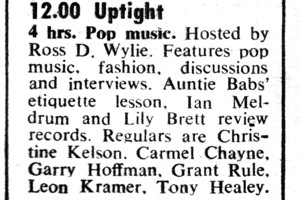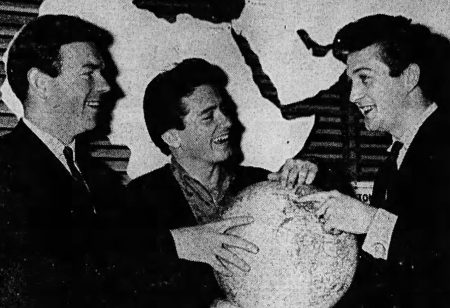
Single on Festival by Brisbane singer and nationally known TV presenter who later went into production and public relations.
Ross D. Wyllie has said that his reason for taking up singing was “one word: polio”, after the childhood disease left him unable to take part in sports. He sang with Brisbane band The Kodiaks before going solo and being signed by Sunshine Records. He was backed by The Escorts, on tour and on record, and his first single (1967) was credited to Ross D. Wyllie And The Escorts.
He became a familiar face when he hosted national TV pop shows Uptight (from 1967) and its successor Happening ’70. He had a handful of charting singles 1969-1972, notably his 1969 hits Funny Man (#15 Australia) and The Star (#1 Australia).
Further reading: 1. The Wikipedia article on Ross D. Wyllie is probably the most thorough source online and has been recently updated (2023). 2. Ross D. Wyllie interview by Rev Bill Crews on 4BC, 2023.

Ray Stevens’s 1963 single had been re-released in July 1968, but this is a slower rearrangement of Funny Man from the September 1968 Mercury album Even Stevens.
The original single track from 1963 went for 2.33 mins, this re-recording comes in at 3:01 mins.
Ross D. Wyllie had a hit by following this slower album track while another Australian version by Bobby Cookson that covered the original 1963 arrangement was less successful.
In a 2023 radio interview, Ross D. Wyllie refers to this: [Ray Stevens] recorded two versions of it, an up-tempo version and the slow version … I was very lucky to record the slower version.
Sources: 1. Ross D. Wyllie interview by Rev Bill Crews on 4BC, 2023. 2. Informed commentary by video poster the45prof98 at YouTube.
Single on Go!! August 1965, the last by Melbourne singer and guitarist Bobby Cookson (born c.1941).
This was covering Ray Stevens’s original up-tempo version of Funny Man (1963).
Cookson was vocalist with The Premiers when he was signed to the Astor label, but his association with the band continued in the recording studio. Of nine singles 1961-65 (on Astor, Leedon and Go!!) four were credited to Bobby Cookson With The Premiers, and four others were released under Cookson’s name only.
Four of Cookson’s singles charted:
• Flutter Flutter (1961, #20 Melbourne, #46 Australia)
• Timber (1962, #29 Melbourne, #68 Australia, covering a 1960 single by Curtis Carrington)
• I Could Have Loved You So Well (1963, #14 Melbourne, #44 Australia, with The Premiers)
• Rona (1963, #28 Melbourne, #57 Australia, with The Premiers, written by band member Lee Conway, later a successful country artist).
The Premiers also recorded under their own name (Mary Had A Little Lamb, 1963, #37 Melbourne) and backed Betty McQuade, although not at the time of Midnight Bus.
Cookson possessed a powerful, Roy Orbison-style voice that made him a powerful attraction
Ian McFarlane
Sources, further reading: 1. Ian McFarlane, Encyclopedia of Australian Rock & Pop. 2. Spencer et al, Who’s Who of Australian Rock. 3. Notes on a 2004 Premiers reunion (without Bobby Cookson) at the Peter Doyle website.
Suggestion from Bruce R. Gillespie.

Single on Mercury February 1963 and on 1963 album This Is Ray Stevens.
This original track, at 2.33 mins, was re-released in July 1968 on a Mercury single. However, the version heard on the September 1968 album Even Stevens was a re-recording at 3:01 mins (see above).
This serious song contrasts with the zany comedy records that gave Ray Stevens many of his biggest hits: Ahab The Arab (1962, #5 USA), Gitarzan (1969, #8) and The Streak (1974, #1). The title of his first national Top 40 hit just about sums up the style of humour: Jeremiah Peabody’s Poly Unsaturated Quick Dissolving Fast Acting Pleasant Tasting Green & Purple Pills (1961, #35).
On the other hand, he has often shown other sides to his talent, for example with the social commentary of Mr Businessman (1968, #28) and the sentimentality of Everything Is Beautiful (1970, #1). In 1974 he released his uptempo, banjo-driven version of Erroll Garner & Johnny Burke’s Misty (#14 USA), a masterful transformation of a wistful jazz standard into an easygoing country song.
Chart positions from Joel Whitburn’s top pop singles 1955-2002 [Internet Archive].
Further reading: See the Ray Stevens album and singles discographies, as well as biographical notes and cover shots, at Petr Vitous’s excellent Country LP Discography website.
Official site: RayStevens.com
Thanks to Tony Watson for erratum.
![]() Same title but not the same song as ‘Funny Man’ by Ross D. Wyllie.
Same title but not the same song as ‘Funny Man’ by Ross D. Wyllie.
A clue: the composer of this Funny Man is Stephens, not Stevens.
On HMV album Always Yours September 1963.
John Leyton: British pop idol (b. 1936) who had a number of songs on the British charts 1961-64, including Johnny Remember Me (1961, #1) and Wild Wind (1961, #2). He is also an actor: see his filmography at IMdB.
♫ Listen at YouTube
Recommended reading: The Wikipedia article on John Leyton is comprehensive.